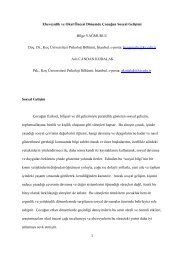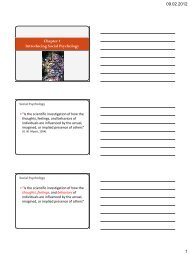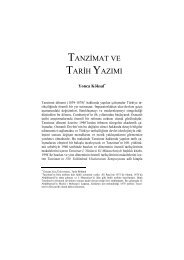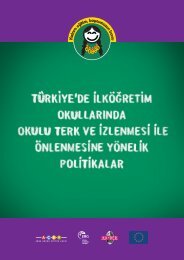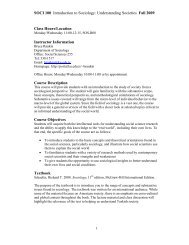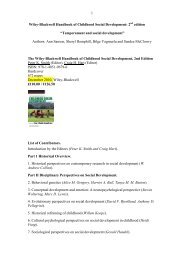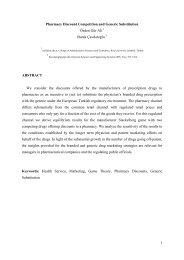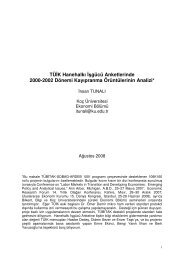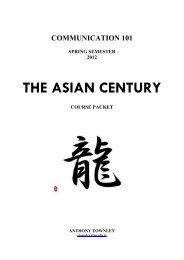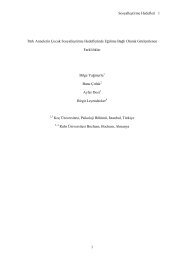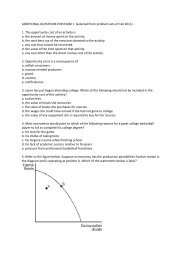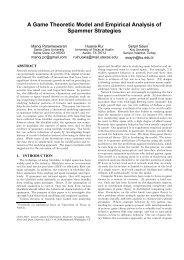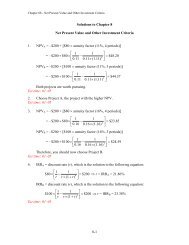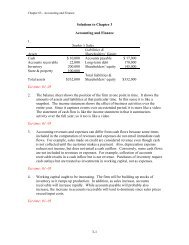Syllabus (pdf) - KUAIS - Koç University
Syllabus (pdf) - KUAIS - Koç University
Syllabus (pdf) - KUAIS - Koç University
Create successful ePaper yourself
Turn your PDF publications into a flip-book with our unique Google optimized e-Paper software.
THE MIDDLE EAST IN A GLOBALIZED WORLD - INTL. 448 (1)2013 SPRINGClass Meeting LocationClass Meeting TimesTH B1,TU B1InstructorÖZLEM ALTANOffice HoursOffice Location CAS 141Office Phone 1617Emailozaltan@ku.edu.trWeb AddressNumber of Credits 3ECTS Credits 6PrerequisitesLanguageEnglishAssistantN/ACourse DescriptionContemporary realities of societies and politics of the Middle East and North Africa as part of worldwide ties and exchanges. Anexamination of alternative ways to study the region and its recent history, concentrating on the post-World War II period. A variety ofdiscourses and practices such as those on citizenship, rights, national identity, religion, gender, transnational migrations, socialmovements, economic development, and urban transformations.Course ObjectivesThis is a course on contemporary politics in the Middle East, combining discussions of modern history and current global connections.In the recent decades globalization has become a catchall concept, invoking a variety of intense flows and interconnections betweenseemingly different regions, peoples, and cultures. In many of these images, it seems as if "globalization" comes in from outside thelocal context and acts to change, for better or worse, a variety of ?stagnant? regions of the world. In this course we will take up theMiddle East to explore and critique the totalizing images offered by such accounts.We will begin with an examination of general approaches that offer alternative ways to study the Middle East. Then we will explore the20th century in the region, by an explicit focus on networks of global and local institutions, practices, and discourses that haveproduced and reproduced various kinds of inequalities and exclusions. We will seek to understand the experience and agency of,again, ordinary people. The issues will include urban politics, labor, gender, development, and social movements.Learning OutcomesOur aim will be to explore the everyday practices that form and sustain the categories of the global and the local, and gain a solidunderstanding of the contemporary politics of the Middle East as part of worldwide ties and exchanges. We will do so by studyingpolitics as it is experienced by ordinary people in the region and question over-generalized and grandiose perspectives. Thus this isnot a class on high politics and interstate relations. Our focus will be on selected issues of inequality and exclusion and how peoplerespond to them.Teaching MethodsLectures, class discussions, student presentations, Use of online media toolsCourse ContentsTopicsSessionStarting DateNumber4 05/02/2013 Orientalism and Other Mistakes2 19/02/2013 Global Ties and Exchanges2 25/02/2013 The Middle East as part of Global Ties and Exchanges
Feb 29, 2012. The End of Taking the Syrian Revolution at Face Value. Jadaliyya.Other1. Attendance and participation: Regular attendance is a must if you are serious about your work and the grade you will receive. Beinglate to class is inexcusable and will affect your grade. I expect everyone to be in class on time.Having perfect attendance does not mean you get full credit for class participation. Please come to class with specific questions youmay have on the readings or the lectures.2. Readings: You are expected to have completed the readings before the first lecture of each week. The reading package will beavailable in the Xerox.For some sessions additional readings will be assigned from contemporary sources. These will be made available in the F Drive andwill be announced in advance. You are required to complete these readings on time.All of your readings are imperative to your learning. However they are not there for memorization or crunching before the exams. Inorder to get a satisfactory experience out of this class, you must read and engage with them on time; and relate them to classdiscussions. In class we will engage with all of the readings, almost always move beyond them, and sometimes end up challengingthem.3. Classroom conduct: Please remember that you are invited to respectfully and analytically question any arguments or opinions youread or hear in this course. There will most likely be disagreements during discussions and your contributions will be evaluated withrespect to their intellectual content and your willingness to follow general rules of courtesy.In this class we challenge and move beyond conventional ways of thinking. We should be open and ready to discover new ways oflooking at the world in which we live and explore analytically if and why we might be inclined to resist changing the categories weoffhandedly use. We should work to understand the power relations that go into the construction of our knowledge and ideas, and notemphatically defend them. This exercise is a tremendously important part of your experience in this class.Please note that you are encouraged to take this class if and only if you have already successfully completed a minimum of two yearsof course work toward your BA, and at least 2 of the following: introductory courses in political science, sociology, anthropology, andcomparative politics.Academic DishonestyHonesty and trust are important to us all as individuals. Students and faculty adhere to the following principles of academic integrity at<strong>Koç</strong> <strong>University</strong>.1. Individual accountability for all individual work, written or oral. Copying from others or providing answers or information, written ororal, to others is cheating.2. Providing proper acknowledgment of original author. Copying from another student?s paper or from another text without writtenacknowledgment is plagiarism. Recycling a paper written for another class also falls under this category.3. Study or project group activity is effective and authorized teamwork. Unauthorized help from another person or having someoneelse to write one?s paper or assignment is collusion.Cheating, plagiarism, and collusion are serious offences resulting in disciplinary action and an F grade.You can refer to the following website for a more detailed guide on how to follow rules of conduct regarding academic honesty. Iencourage you to take a look at it both for this class and for the rest of your education:http://web.gc.cuny.edu/provost/<strong>pdf</strong>/AvoidingPlagiarism.<strong>pdf</strong>



